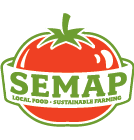Fall is a bittersweet time for me. I do miss sunshine-y beach days (and fresh tomatoes!), but there’s something special about the crisp, cool days of autumn. Everything seems to slow down a bit, and I find myself with a little extra time on my hands. If I’m not in the kitchen, you can usually find me reading. Here’s a few books the fellow conscious consumer can appreciate:
The Ominvore’s Dilemma by Michael Pollan
I just started reading this book after my brother recommended it to me. So far, it’s really interesting. It takes a look at our modern food system to answer the seemingly simple question, “What’s for dinner?” The book is broken down into three categories: industrialized food, alternative food, and food either hunted, gathered, or grown by those consuming it. Although I haven’t finished it yet, I feel comfortable recommending it to anyone interested in expanding their knowledge of current food systems. (Psst…Americans are literally made of corn).
Born With a Junk Food Deficiency: How Flaks, Quacks, and Hacks Pimp the Public Health by Martha Rosenburg
This book is broken down into two books, essentially. I’ve only read the latter part of the book which focuses on the industrial meat system and factory farming. After reading this book, I spent several months as a vegetarian, and then transitioned to what some might call a flexitarian. Typically I only eat meat once a day, and only if I know the meat was humanely raised and not pumped with antibiotics and hormones. Luckily, it’s easy to find meat you can feel good about all across Southeastern Massachusetts.
Tomatoland: How Modern Industrial Agriculture Destroyed Our Most Alluring Fruit by Barry Estabrook
Tomatoland exposes our favorite red fruit in a way that many have never thought of. When we bite into a slice on our sandwich we don’t often think about how it got there. Tomatoes are often grown and harvested in ways that are harmful to the environment and people. Tomato production also relies heavily on slave labor (even in this country).
I’ve been told I take the fun out of eating when I start discussions about our modern industrial food system. However, I think it’s important to be aware of how your dinner got to your plate. Rather than “take the fun out of eating,” educating yourself about what you eat might challenge you to buy more locally. Finding new farms and trying different local dishes is both enjoyable and delicious.
Here’s to conscious consumption,
Kendra
